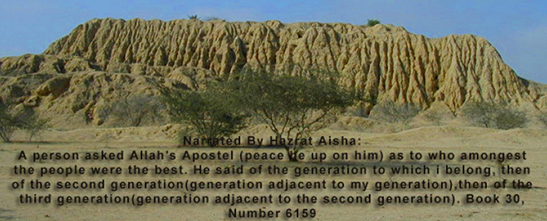Companions Of The Holy Prophet

Most Muslim scholars define the companions (sahaba) of Prophet Muhammad (PBUH) to be the people who lived during his time period, and saw or heard him speak, even for a brief moment.
To embrace Islam in those days meant to invite trouble and misery of oneself. Despite this, those scared souls, the companions of the prophets, known as Sahaba, accepted Islam without any fear of trouble and atrocities. No one could succeed in attaining such sublime state in Faith and Knowledge as these few fortunate ones. By enduring all sorts of humiliation and unbearable atrocities in the way and love for the Devine Message and devotion to Righteous path, they sent examples which will serve as a beacon light for the seekers of Truth and Righteousness.
It is a sign of true faith that when a man accept it, believing to be righteous, he holds to it with rock-like firmness, under all forms of calamity, hardship and trial, and so did the Companion of the Prophet peace be upon him. They endured all kinds of hardship and put little values of their own lives in defence of their belief. They embrace Islam in perfect sincerity and with true heart, so they endured all the hardships and afflictions for the sake of God and His Massager with poise, dignity and smiling faces.
Islam teaches that no person should be praised or condemned without a valid reason regardless of their origin, belief, or color. According to the Noble Quran, those nearest to Allah are the ones who are the most pious, “Verily, the most honorable of you with Allah is that believer who has more piety and righteousness.” Neither blood relation, friendship, companionship, monetary status, nor social status play a role in nearness to Allah.
As for the companions (sahaba), the Noble Quran divides them into two groups. The first consists of those who were truthful and loyal, and had sacrificed their wealth and souls (i.e. life) to defend the cause of Islam. The Quran says, “Those who believed and emigrated and strove hard and fought in the cause of Allah with their wealth and their lives are far higher in degree with Allah. They are the successful. Their Lord gives them glad tidings of mercy from Him, that He is pleased (with them), and of Gardens for them wherein are everlasting delights. They will dwell therein forever. Verily, with Allah is a great reward. Other numerous verses in the Noble Quran hail the good companions of the Prophet, such as the al-Badriyun, those who stood by the Prophet during the Battle of Badr, even though their number was less than one third of their enemies and their weapons were trivial compared to the weapons of their adversaries. They stood firm and sacrificed their lives and are among the best of examples for the Muslims.

Likewise, there were respected women among the sahaba who participated in the political, social, and economic life of Islam, such as Um Amarah who sacrificed four sons to defend Islam. While tending to the fatal injuries of one of her sons, Um Amarah herself went to the battlefield to fight the enemy. The Prophet witnessed her bravery and said about her, “O Um Amarah, who can bear what you are bearing?”
However, there is another group—the hypocrites, which the Noble Quran clearly describes. Numerous verses in the Noble Quran condemn their attempts to destroy the Muslim nation. In particular, there are two Surahs in the Noble Quran that refer to some of the companions as hypocrites: Surah 9 (al-Tawbah or The Repentance) and Surah 63 (al-Munafiqeen or The Hypocrites). In Surahtul Munafiqeen, the Noble Quran teaches that people should not be judged by their physical appearance, or even by their public actions, but rather by their sincerity and dedication to Allah, His Prophet, and the Muslim nation. This Surah says, “And when you look at them, their bodies please you, and when they speak, you listen to their words. They are as blocks of wood, propped up. They think that every cry is against them. They are the enemies. So beware of them; may Allah curse them.
How are they denying the right path?” These are the disobedient whom Allah will not forgive on the Day of Judgment, according to the Noble Quran, “It is equal for them whether you (Prophet Muhammad) ask forgiveness for them or do not ask forgiveness for them. Allah will not forgive them. Verily, Allah guides not the people who are rebellious, disobedient to Allah.” Although they performed the prayers and gave alms (zakat), these acts stemmed from their hypocrisy and desire to show off and were not for the sake of Allah. The Quran also says, “And nothing prevents their contributions from being accepted except that they disbelieved in Allah and in His Messenger and that they came to prayers only in a lazy state, and that they only offer contributions (zakat) unwillingly.” Even when praying behind the Prophet himself, whenever a trade caravan would enter Madina, these hypocrites would leave their position in the prayer row to watch the caravan, rather than listen to the sermon of the Prophet of Allah. The Quran states, “And when they see some merchandise, or some amusement, they disperse headlong to it, and leave you (Muhammad) standing (while delivering the Friday jum'ah congregational religious sermon). Say: that which Allah has is better than any amusement or merchandise, and Allah is the best of providers.”
According to historical reports, some of these hypocrites who posed as the Prophet's “companions” were actually plotting to kill him. The Noble Quran mentions that they had schemed to start a civil war in Madina:
Verily, they had plotted sedition before and had upset matters for you—until the truth (victory) came, and the Decree of Allah became manifest though they hated it.
They (the hypocrites) say, 'If we return to Madina, indeed the more honourable (the chief of the hypocrites) will surely expel the abased (Allah's Messenger and his followers) from it .' But honour, power, and glory belong to Allah, His Messenger, and the believers, but the hypocrites know not.
Some of these hypocrites established a masjid and invited the Prophet to inaugurate it, not to please Allah but to compete with the other Muslims and to cause disunity among the believers. Allah ordered the Prophet to refuse their invitation and destroy that masjid which was based on hypocrisy:
And as for those who put up a masjid by way of harming and disbelief, and to disunite the believers, and as an outpost for those who warned against Allah and His Messenger a foretime, they will indeed swear that their intention is nothing but good. Allah bears witness that they are certainly liars. Never stand therein. Verily, the masjid whose foundation was laid from the first day based on piety is more worthy for you to stand therein. In it are men who love to clean and purify themselves. And Allah loves those who make themselves clean and pure. Is he who laid the foundation of his building on piety to Allah and His good pleasure better, or he who laid the foundation of his building on an undetermined brink of a precipice ready to crumble down, so that it crumbles to pieces with him into the Fire of Hell? And Allah guides not the people who are the dhalimun (cruel, violent, proud, hypocrites, and wrongdoers). The building which they built will never cease to be a cause of hypocrisy and doubt in their hearts, unless their hearts are cut to pieces. And Allah is All-Knowing, All-Wise.
Some of the hypocrites would approach the truthful Muslim believers and claim that they were genuinely part of the Muslim nation; yet, Allah informed the Muslims not to believe them, “They swear by Allah that they are truly of you while they are not of you, but they are a people (hypocrites) who intend to divide (the Muslim nation).” The Muslim hypocrites, on countless occasions, insulted and offended the Prophet of Islam, the Quran says, “And among them (the hypocrites) are men who hurt the Prophet and say, 'He is (lending his) ear (to every news).' Say, 'He listens to what is best for you, he believes in Allah, has faith in the believers, and is a mercy to those of you who believe.' But those who hurt Allah's Messenger will have a painful torment.”
Even the Prophet was unaware of some of the hypocrites in Madina. Although he knew of 'Abdullah ibn 'Ubay, the leader of the hypocrites, there were others in the Masjid of the Prophet—in the city of Madina—whom Allah did not inform him about. The Quran says, “And among the desert people (A'arab) around you, O believers, there are some hypocrites, and so are there some among the people of Madina. They exaggerate and persist in hypocrisy. Even you (Prophet Muhammad) know them not. We know them; We shall punish them twice and thereafter they shall be brought to a great, horrible torment.”
Allah's Messenger said, I will be there at the Fountain of Kawthar before you, and I will have to contend for some people, but I will have to yield. I will be saying, My Lord, they are my companions, they are my companions, and it will be said, You don't know what innovations they made after you.

Imam al-Bukhari also narrates a similar version of this hadith:
Allah's Messenger said in the company of his companions, I will be at the Fountain waiting for those who will be coming to me from among you. By Allah, some people will be prevented from coming to me, and I will say, My Lord, they are my followers and the people of my ummah (nation). And He will say, You don't know what they did after you; they have been constantly turning back on their heels (from your religion).
Since many of the companions heard the Prophet saying this, a companion by the name of ibn Abu Mulaikah began then to include it in his supplication. It is reported that he used to say (in supplication), “O Allah, I seek refuge with You that we should turn back upon our heels or be put to any trial about our religion.”
Some of the companion’s committed sins without intending to defy Allah, and Allah promised them forgiveness, “And there are others who have acknowledged their sins. They have mixed a deed which was righteous with another that was evil. Allah shall turn to them in forgiveness. Surely Allah is Oft-Forgiving, Most Merciful.”
The True Companions of The Prophet (pbuh&hf)
But there were those men who were the companions and true friends of The Prophet Muhammad (pbuh&hf).
They were his companions and friends because:
- He chose them for the honour of his companionship and friendship. Not only did they love him, but most importantly, he also loved them. They were truly remarkable men, and their love for him was just as remarkable. It was remarkable, among other things, for its consistency.
- It was love that never faltered. They loved him because they knew that he was:
The Perfect One
The Infallible One - They loved him because they knew that he was:
The loved one of Allah (swt).
It was their glorious destiny to be the members of the "team" which under his leadership, laid the foundations of the Kingdom of Heaven on Earth.Their sacrifices, their tenacity, their courage and their dedication to duty were to be the underpinnings of that Kingdom.
The Holy Quran Al-Majeed itself paid its tributes to them in the following verse:
"And the first to lead the way, of the Muhajireen and the Ansar and those who followed them in goodness - Allah is well pleased with them and they are well pleased with Him, and He hath made ready for them Gardens underneath which rivers flow, wherin they will abide forever. That is supreme triumph."
Quran: 9 verse: 100
Our Attitude towards Them
Our attitude towards the Sahaba should be that of love, respect, peace and purity of our hearts and tongues. Allah has described this in His saying: "And those who come after them say: 'Our Lord! Forgive us and our brethren who have preceded us in Faith, and put not in our hearts any hatred against those who have believed.” (59:10)
The Prophet (PBUH) advised us: "When my Companions are mentioned then withhold" [Saheeh, at-Tabaranee]. And he also said, "Do not abuse my Companions, for if any of you were to spend gold equal to (mountain of) Uhud in charity, it would not equal a handful of one of them or even half of that" (Al Bukhari, Muslim).
And he said, "Whoever abuses my Companions, upon them is the curse of Allah, the angels and all the people" (Saheeh, At-Tabaranee).
Al-Barbaharee said, "Know that anyone who tries to attack the Companions of Muhammad (PBUH) really seeks to attack Muhammad (PBUH)."
The Companions' Noble Deeds
The deeds and virtues of the Sahaba, may Allah be pleased with them all, should be what every Muslim should strive to emulate to the best of one's ability. Their behaviour and sincerity were praised by Allah and His Messenger (PBUH) and that suffices as proof.
The Sahaba were undoubtedly the best in terms of understanding the religious obligations, the Sunnah of the Prophet and the way of establishing the Islamic teachings. Their belief is an example for us, as Allah says in the Al Qur'an: "So if they believe in the like of that which you believe, they are rightly guided, but if they turn away, then they are only in opposition. So Allah will suffice you against them. And He is the All-Hearer, the All-Knower." (2:137)
Following Their Footsteps
All this should suffice as evidence that the correct understanding of Islam is that of the Sahaba and all those that follow their path, in truth. They are the best generation of Islam and they understood Al Qur'an and Sunnah the best.
We should approach the Deen in the manner they approached it. We are obliged to follow them, and that means, first and foremost, to have the same creed as they did, no deviations, no additions and no deletions. We also have to approach `ibadah in the same way, no innovations, no additions and no deletions. We take all of the Sunnah and refer all disagreements to Allah and His Messenger, as Allah (s.w.t.) commanded us in the Al Qur'an (4:59).
We ask Allah to enable us to learn about the lives of the Sahaba and to make our lives resemble theirs. As Ibn Taymeeyah said, "Whoever will read their biographies with understanding and insight will come to know the rewards bestowed by Allah upon them and he will certainly realize that these are the best among humans after the Prophets. Neither has there been anyone like them nor will there be.